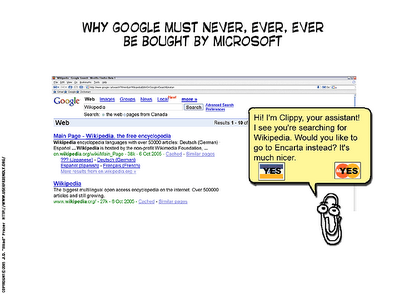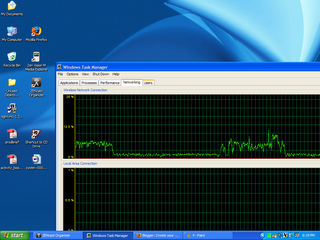Opinions?
My friend is putting together a website, and is looking for feedback. Check out miked.dyndns.org. Leave opinions in the comments.
52 million of whatever's on my mind...
My friend is putting together a website, and is looking for feedback. Check out miked.dyndns.org. Leave opinions in the comments.
Posted by
Daniel Keenan
at
10/30/2006 03:40:00 PM
0
comments
![]()
![]() So, we were thinking of getting FiOS at my house, and I was reading through Verizon's Terms of Service to make sure it was kosher. You can read it for yourself here. On a side note, It was very hard to get to the terms of service. It's listed under "Member Center" on Verizon's FiOS Customer Service Website.
We are going to take this quote by quote:
So, we were thinking of getting FiOS at my house, and I was reading through Verizon's Terms of Service to make sure it was kosher. You can read it for yourself here. On a side note, It was very hard to get to the terms of service. It's listed under "Member Center" on Verizon's FiOS Customer Service Website.
We are going to take this quote by quote:
"14.5 Monitor of Network Performance. Verizon automatically measures and monitors network performance and the performance of your Internet connection and our network as part of this process. We also will access and record information about your computer's profile and settings and the installation of software we provide in order to provide customized technical support and you agree to permit us to access and record such data for the purposes described in this Agreement. We do not share information collected for the purpose of network or computer performance monitoring or for providing customized technical support outside of Verizon or its authorized vendors, contractors and agents. You hereby consent to Verizon's monitoring of your Internet connection and network performance, and the access to and adjustment of your computer settings, as they relate to the Service, Software, or other services which we may offer from time to time."Verizon is saying that they can connect to your network and do diagnostics, and adjust settings on your computer.
"(c) to access or attempt to access the accounts of others, to spoof or attempt to spoof the URL or DNS or IP addresses of Verizon or any other entity, or to attempt to penetrate or penetrate security measures of Verizon or other entities' systems ("hacking") whether or not the intrusion results in corruption or loss of data"I have issues with the terminology that they use here. Not to beat a dead horse, but Hacking and Cracking (what they should be referencing) are two different things. Hacking something could be like hacking my cell phone to change the software on it, or hacking the keyboard driver to enable multimedia buttons under Linux. Cracking is hacking, but with a malicious intent. Connecting to a web server and modifying webpages (ala on SCO a few years back), attempting to access someone's computer and files, etc. As a hacker (not cracker) by the definition I just gave you (not the Verizon one), I take offense to this.
"(g) to post information on newsgroups which is not in the topic area or charter (e.g. off-topic posting) of the newsgroup;"While I do find this annoying, it is most certainly done all the time. Also, correct me in the comments if I'm wrong, but US ISPs shouldn't be allowed to tell me what I can and can not do with the Internet connection that I'm paying for.
"(j) to damage the name or reputation of Verizon, its parent, affiliates and subsidiaries, or any third parties"If I were posting this using a Verizon FiOS connection, Verizon could cancel the internet connection without notice or refund, legally.
"...You agree that your name, UserID, and other identifying information may be placed in our user directory."I hate to say it, but Microsoft has done something right. Microsoft lets MSN Subscribers opt-out of being in their User Directory. Verizon should follow Microsoft's example, but only in this context.
3.7.5 You may not use the Broadband Service to host any type of server personal or commercial in nature.This would leave me High and Dry. I run a small webserver (running the LAMPPP (Linux, Apache, MySQL, Perl, Python, PHP) stack, mind you) that has calendars, and a photo album for our family (It's password protected, so don't try looking for it). This pretty much says that I can't do that. They would probably rather have me use the Personal Web Space because it features ads. PWS, in a word, sucks. It doesn't allow you to have a database, CGI scripting is disallowed. Think AOL Hometown, without the AOL part. They don't give you the alternative of hosting your own server and administering it yourself. To make sure that you don't hog bandwidth, they should just put a limitation on the amount of bandwidth that you can use for traffic coming out port 80 and 8080.
"14.4 Verizon Network. For the purposes of backup and maintenance, we may use, copy, display, store, transmit, translate, rearrange, reformat, view and distribute your information to multiple Verizon servers. We do not guarantee that these procedures will prevent the loss of, alteration of, or the improper access to, your information."Verizon, scratch that, anyone should not be allowed to reformat web pages. Imagine if Microsoft payed Verizon an LSM*. I'm going to Wikipedia, and I get redirected to a site that says "You should try Encarta. It's much beterer. User Friendly did a good cartoon on what would happen. Just ignore the Google part:

"(d) injuries to or death of any person and for damages to or loss of any property, which may in any way arise out of or result from or in connection with this Agreement, except to the extent that such liabilities arise from the active negligence or willful misconduct of the other party;"The internet is hazardous to your health, and can be deadly if handled improperly. Consult your doctor before using. If you have the sudden urge to visit hampsterdance.com, stop using immediately and consult your psychologist.
"(d) injuries to or death of any person and for damages to or loss of any property, which may in any way arise out of or result from or in connection with this Agreement, except to the extent that such liabilities arise from the active negligence or willful misconduct of the other party"No, you dolts! The Internet isn't owned by Verizon. <sarcasm>The Internet is owned by your friendly neighborhood blogger, Me!</sarcasm> I'm going to hold off on getting FiOS until Verizon can get it's act together. Verizon, if you're reading this, you have what we in the industry like to call a TOS POS**. Please fix it.
Posted by
Daniel Keenan
at
10/21/2006 09:36:00 AM
11
comments
![]()
I have found yet another bug in Windows. This one has to do with the Windows Task Manager. Let's take a look:
 In order for the bug to present itself, the window must be maximized.
In order for the bug to present itself, the window must be maximized.
 Double click on the tab bar. This makes the current tab's contents full screen.
Double click on the tab bar. This makes the current tab's contents full screen.
 This window, however, is just that. A Window. That means you can move it around. Move the window around, until a good portion is hidden, as seen in the picture above.
This window, however, is just that. A Window. That means you can move it around. Move the window around, until a good portion is hidden, as seen in the picture above.
 Double click on the window to bring it out of pseudo-full-screen mode.
Double click on the window to bring it out of pseudo-full-screen mode.
 The bug, is that the window is still maximized, as seen (You can't re-maximize a maximized window). The only way to restore it is to right click on the program's button and choose restore. You can also double click on the Title Bar.
The bug, is that the window is still maximized, as seen (You can't re-maximize a maximized window). The only way to restore it is to right click on the program's button and choose restore. You can also double click on the Title Bar.
Posted by
Daniel Keenan
at
10/11/2006 06:28:00 PM
1 comments
![]()
My computer isn't booting. I'm probably starring a $500 Motherboard replacement in the face, so don't expect to hear from me for a while.
Posted by
Daniel Keenan
at
10/02/2006 10:46:00 AM
0
comments
![]()
